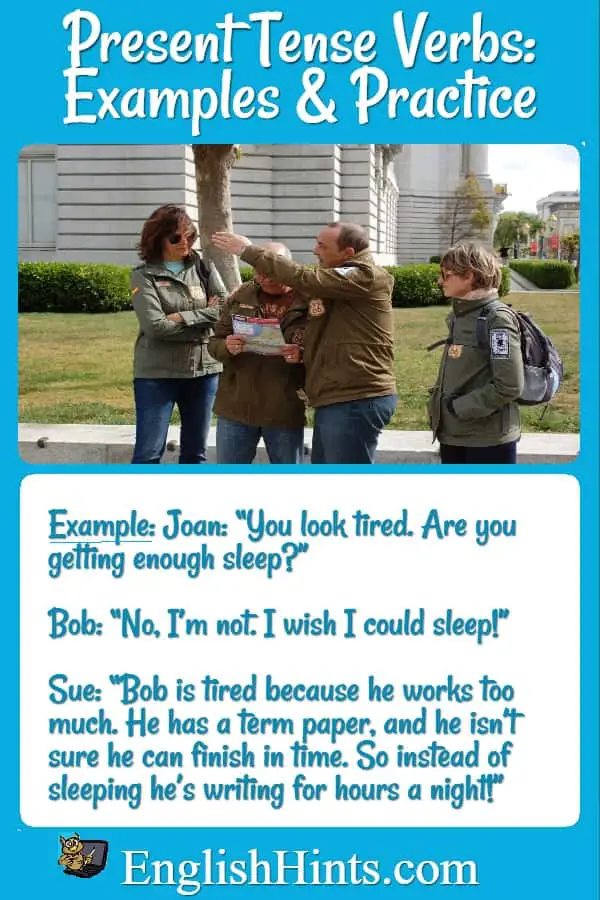Present Tense Verbs
Present tense verbs in English can have three forms:
- the base form: go, see, talk, study, etc.
- the base form plus 's' (or 'es') for 3rd person singular: goes, sees, asks, studies. (For example, Joe goes to school, Ann sees a bird, Bill talks a lot, but he also studies.)
- and the base form plus 'ing': going, seeing, talking, studying. (With a form of 'to be,' this is the present continuous tense.)
This page has a short explanation, some examples, and a chance for you to practice them.
The simple present tense is the way to talk about facts. It tells what is always, sometimes, or never true, or what happens over and over.
It uses the base form of the verb (the infinitive without ‘to’) except in the third person singular. 3rd person singular (he, she, or it-- one person or thing) ends in -s.
For example, we say 'I study' or 'you study, but 'John studies.' Sally and Susan study too. The simple present usually adds -s or -es to the base form. Exceptions:
- the verb ‘to have,’ (he or she has), &
- the verb ‘to be,’ (he or she is.)
Negatives and questions normally use the helping verb ‘to do’ plus the base form of the main verb. See examples below.
We use the present continuous tense to talk about something that is happening right now. (I’m typing; you’re reading; my husband is driving and my daughter is sleeping.) We form it using the verb 'to be' with the ‘ing’ form (present participle) of the main verb, as shown.
Examples of Present Tense Verbs in Sentences
Joan: “You look tired. Are you getting enough sleep?”
Bob: “No, I’m not. I wish I could sleep!”
Sue: “Bob is tired because he works too much. He has a term paper that’s due soon, and he isn’t sure he can finish in time. So instead of sleeping he’s writing for hours every night!”
Joan: “That’s too bad! I hope you finish soon, Bob!”
Bob: “So do I! I’m almost done now! Then I plan to get back to normal. I usually sleep six or seven hours a night, but I think I might sleep twelve hours to catch up!”
Joan: “Wow! Only a baby sleeps twelve hours at a time!”
Notes:
· When Bob says “So do I,” it’s a short form that means “I hope so too.’
· See The Verb ‘to be’ page if you have questions about how to form contractions. (Examples: he’s, isn’t, aren’t, etc.) That page also gives the present tense forms of 'to be.'
· If you have questions about could, can, might, or similar helping verbs, see Modal Verbs.
Try Using Common Present Tense Verbs
Choose the correct form (or forms) for each sentence and write your answers on a piece of paper.
Example: 1. Joe (is, are) an athlete. 2. He (run, runs, is running) in every competition. 3. Every other Saturday Joe (have, has, is having) a track meet at school. 4. He usually (get, gets, is getting) up at 6 A.M., but even though it’s 5:30 A.M. right now he (get, gets, is getting) up for today’s race.
Answers: 1. is. 2. runs. 3. has. 4. gets, is getting.
(Explanation: The first sentences talk about something that is true-- Joe is a runner. Examples 2-3 talk about things he does repeatedly.
The last sentence talks about what he usually does, and then about what he is doing right now-- this time, rather than often or all the time. So the last ‘get’ is in the present continuous tense, because it’s going on now.) For the next answers see the link at the bottom of the page.
5. I (like, likes, am liking) to read.
6. Does Jim (like, likes, is liking) to study?
7. Every weekday morning at 8 A.M. Josh (go, goes, is going) to work.
8. Many mornings when I (wake, wakes, am waking) up, I (hear, hears, am hearing) the birds singing.
9. Sarah (take, takes, is taking) the bus to work often.
10. She (live, lives, is living) too far from her work to walk.
11. Do you (know, knows, are knowing) the time?
12. It’s 10:30. Are you (ask, asks, asking) because you don’t (have, has, is having) a watch?
13. No. I (have, has, am having) a watch, but I (have, has, am having) trouble seeing right now, after an eye exam.
14. Some high school students don’t even (try, tries, are trying) to answer questions in class.
15. For example, Bill (come, comes, is coming) to class every day, but he never (give, gives, is giving) the answer to the teacher’s questions.
16. He always (leave, leaves, is leaving) the moment the bell rings.
Click here for the answers to Present Tense Verbs.
Related Pages
The simple past tense of regular verbs ends in -ed. It's easy to form, and not hard to spell or pronounce if you learn a few easy rules.
Learn irregular verbs more easily with the patterns in these 12 lists.
Pdfs with grammar games & exercises for verb tenses (especially irregular past tense verbs) +
Home> English Verb Tenses> Present Tense Verbs.
Didn't find what you
needed? Explain what you want in the search box below.
(For example, cognates, past tense practice, or 'get along with.') Click to see the related pages on EnglishHints.
| site search by freefind | advanced |










